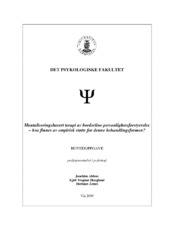Mentaliseringsbasert terapi av borderline personlighetsforstyrrelse - hva finnes av empirisk støtte for denne behandlingsformen?
Master thesis
Permanent lenke
https://hdl.handle.net/1956/3492Utgivelsesdato
2009-04-15Metadata
Vis full innførselSamlinger
- Faculty of Psychology [527]
Sammendrag
We have reviewed empirical evidence regarding the effectiveness of A. Bateman and P. Fonagys mentalization-based treatment (MBT) for borderline personality disorder (BPD). Through literature-search in the databases PsychINFO, PubMed and Ovid Nursing, we found one randomized controlled trial with two follow-up studies conducted by the developers of MBT. The results of these studies were promising. Patients in the MBT-program showed statistical significant and lasting improvement on most measures, in contrast to patients treated with standard psychiatric care. We have performed a thorough analysis of the methodology of these studies, and have found certain weaknesses. These include among others the lack of an active control-group, a small sample size, possible allegiance effects and lack of stratified randomization. Lack of complementary forms of evidence and replication of these studies by independent researchers makes it difficult to draw an empirically based conclusion about the effectiveness of MBT, especially its comparative effect to other established treatments. We conclude that further research should be done to verify the potential benefits of MBT as a treatment for BPD. Vi har sett på empiriske undersøkelser av hvorvidt A. Bateman og P. Fonagy sin mentaliseringsbasert terapi (MBT) er effektiv i behandlingen av pasienter med borderline personlighetsforstyrrelse. Vi fant gjennom litteratursøk i databasene PsychINFO, PubMed og Ovid Nursing en randomisert kontrollert studie med to oppfølgingsstudier utført av Bateman og Fonagy. Resultatene av disse studiene var lovende. Pasientene som fikk MBT hadde statistisk signifikante og varige forbedringer på de fleste mål. Dette stod i kontrast til kontrollgruppen som fikk standardbehandling. Vi har gjort en grundig gjennomgang av metodikken i disse studiene og har funnet enkelte svakheter. Disse inkluderer blant andre manglende bruk av en aktiv kontrollgruppe, et lite utvalg, mulige effekter av forskernes tilhørighet til metoden og mangel av stratifisert randomisering. Mangel av andre former for evidens og replikering av disse studiene av uavhengige forskere gjør det vanskelig å trekke sikre konklusjoner om metodens effektivitet. Dette gjelder spesielt dens komparative effekt i forhold til andre veletablerte behandlingsformer. Vi konkluderer med at mer forskning må til for å verifisere hvorvidt MBT er effektiv som behandling av personer med borderline personlighetsforstyrrelse.
Utgiver
The University of BergenOpphavsrett
Copyright the author. All rights reservedThe author
